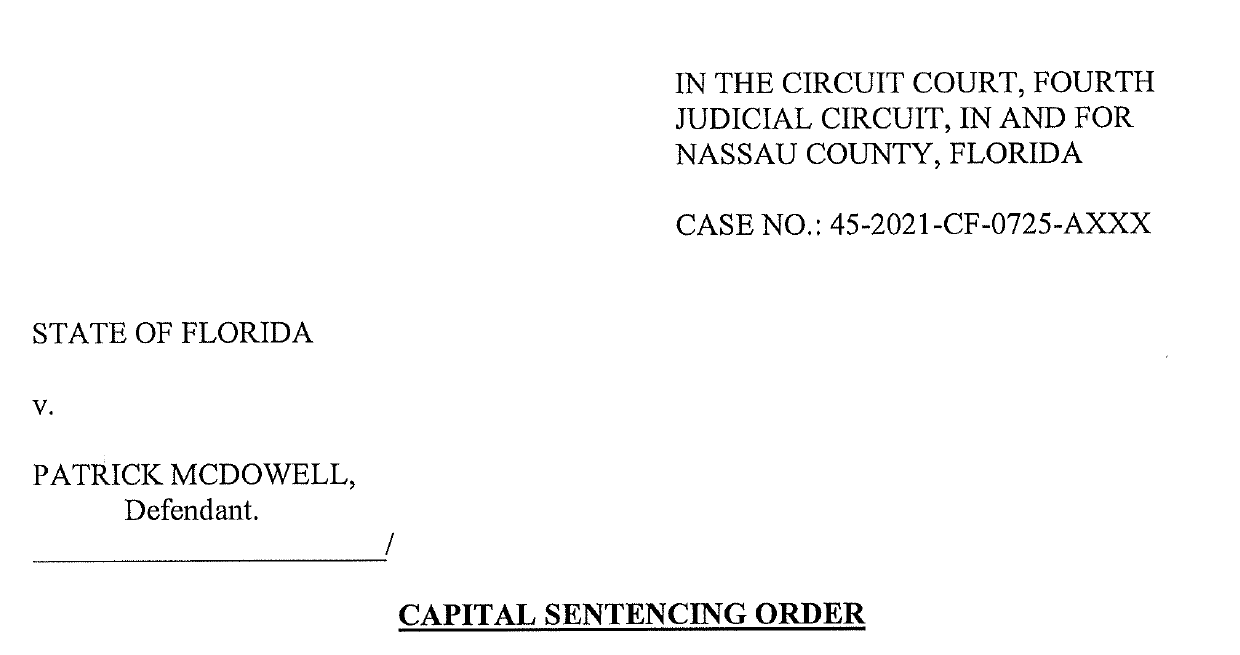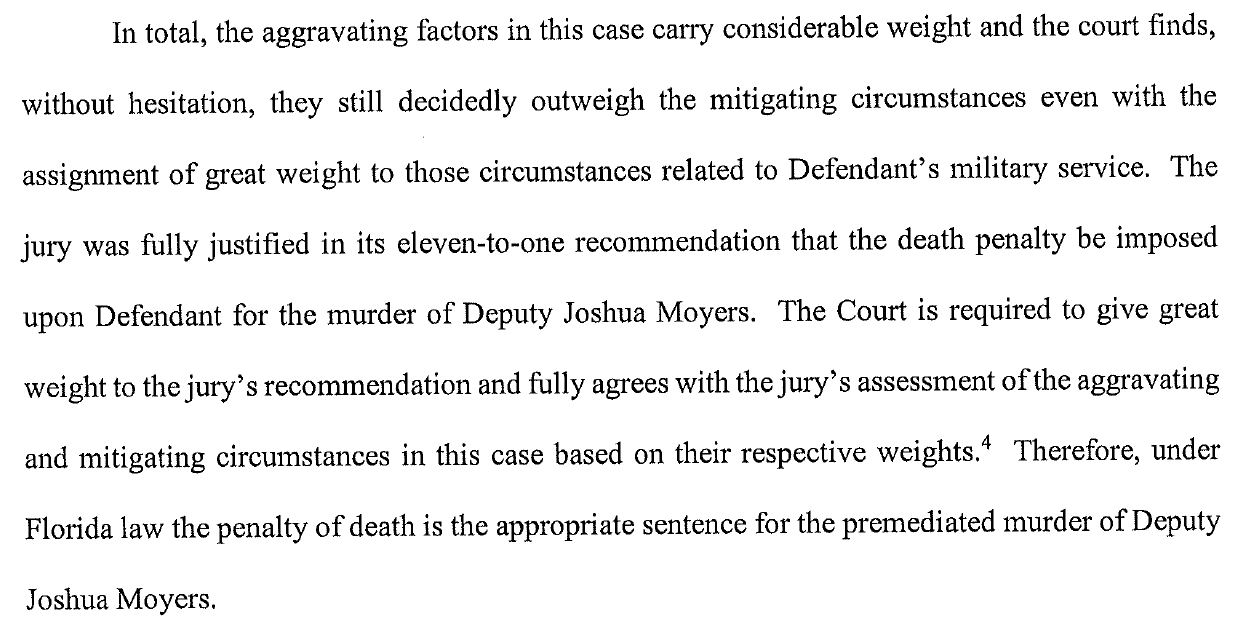Nassau County: Patrick McDowell sentenced to death
This week, the trial court sentenced McDowell to death, following the jury's 11-1 recommendation for death.
As TFDP previously covered, in April, a jury recommended by a vote of 11-1 that Patrick McDowell, a Marine Corps veteran, be sentenced to death for killing Nassau County Sheriff’s Deputy Joshua Moyers.
On May 14, McDowell filed a Motion for New Penalty Phase Hearing. On June 11, the trial court issued an Order denying the Motion.
This week, the trial court sentenced McDowell to death. In the Sentencing Order, the trial court found the following aggravating factors (as found by the jury) and applied the noted weight:
The capital felony was committed by a person previously convicted of a felony and under sentence of imprisonment or placed on community control or on felony probation (moderate weight);
Defendant was previously convicted of another capital felony or of a felony involving the use or threat of violence to the person (very great weight);
The capital felony was committed for the purpose of avoiding or preventing a lawful arrest or effecting an escape from custody, and the victim of the capital felony was a law enforcement officer engaged in the performance of his or her official duties (very great weight); and
The capital felony was a homicide and was committed in a cold, calculated, and premeditated manner without any pretense of moral or legal justification (very great weight).
As to mitigation, the trial court found the following and applied the noted weight:
Moderate weight: McDowell’s parents separated when he was six-months old, and he saw his father only at Christmas and summertime until he was 18 years old. He was a well-adjusted child who was polite, obedient, and respectfully toward others, including to his step-father who was a police officer. He was respectful to other police offers who socialized with his family.
Little weight: In high school, McDowell lost two friends to an automobile accident and served as a pall bearer at the double funeral for the students. He volunteered with a rescue service responding to scenes where people were injured. He loved his mother and was close to her in spite of mental health problems she suffered.
Moderate weight: While he was in high school, McDowell applied for, and was accepted into the U.S. Marine Corps Delayed Entry Program at a time when the United States was heavily engage din a ground war with Iraq and Marines were being killed.
Moderate weight: McDowell attended high school regularly without failing a grade, graduating from high school on time with a GPA of 3.02. McDowell’s entry into the Marines was delayed because of a knee injury and a subsequent arrest at the age of 18. He moved to Florida where he worked to pay restitution, leading to a misdemeanor disposition of his charges in Harrisburg, Indiana.
Great weight: McDowell enlisted in the Marines in Florida in 2005 at a time when he knew the United States was still engaged in a ground war in Iraq. During his four-plus years in the Marines, McDowell worked hard and served his country and his unit with distinction, in the United States and abroad. He was promoted in rank to Sergeant, was selected as the Battalion Commander’s radio operator and Personal Security Detail in Jump Platoon and received outstanding performance evaluations and Navy and Marine Corps Achievement Medals. He was respected as a mentor and teacher of junior Marines. He was honorably discharged.
Great weight: McDowell extended his enlistment in the Marines to deploy to a war zone in Iraq.
Great weight: While he was in Iraq, he was singularly responsible for communications between the Battalion Commander and the Battalion and all air support.
Moderate weight: McDowell returned from deployment in Iraq with symptoms of PTSD apparent to his family.1
Little weight: McDowell formed friendships with Michael Patrick Fowler and others on the Airsoft Team and was a good teammate, giving some members of that team advice about how to enter the military service. He also attended Florida State College in Jacksonville for two semesters to prepare for a job as a firefighter.
Moderate weight: McDowell returned to Iraq as one of the youngest employees of Triple Canopy, a private military contractor, at a time when terrorists and insurgents were still trying to kill Americans. At Forward Operating Base Delta, he worked in the Tactical Operations Center and also assisted at the Entry Point where he observed military casualties and children intentionally burned by their parents. He was present when the base received indirect fire.
Moderate weight: McDowell still suffers from PTSD as a result of his service to his country in the Iraq War - either during his service with the U.S. Marines or his service with Triple Canopy, or both. PTSD is a mental condition that requires treatment to reduce its impact on everyday life.2
Little weight: McDowell never made a claim for Social Security or VA disability for PTSD or any other disability.
Little weight: McDowell was a trusted employee of the Gold Leaf Security Company and Signal 88 Security Company while working at industrial locations and multi-family housing.
Moderate weight: McDowell has good relationships with police officers in Jacksonville who responded to calls at the apartment complexes where he worked.
Moderate weight: McDowell was distressed when he learned in 2017 that Ryan Baker, a Jump Platoon member and junior radio operator, died by suicide.
Moderate weight: McDowell maintained employment during most of his adult life.
Moderate weight: McDowell completed the Matrix drug program and was doing well in VTC when COVID hit in March 2020, bringing an end to regular reporting, regular court appearances, and regular urinalysis.
Moderate weight: McDowell was an attentive and caring father to his 13-year-old son, Nathan, before he became addicted to drugs, and he has reconnected with his son since his arrest in this case.
Moderate weight: McDowell became addicted to methamphetamine. When used frequently over a period of weeks or days, meth can cause illogical thinking, paranoia, psychosis, bad judgment, sensations of skin damage, and resultant “picking,” and a physical need for more meth. Addiction is a medical condition that requires extensive treatment during which addicts often relapse.
Moderate weight: At the time of the crime, Patrick McDowell had been going without sleep for three days, was on a methamphetamine binge, and was under the acute influence of methamphetamines he had used with Breiana Toler earlier in the day and with Noelle Gale shortly before the crime. He had used an intense method of ingesting meth known as “hot-railing.”
Moderate weight: McDowell has behaved appropriately in jail during his incarceration and in court during sentencing. He pleaded guilty and testified, taking full responsibility for his crime and explaining the remorse he feels for the family of Deputy Moyers and everyone affected by his crime.
Moderate weight: McDowell cares about the members of his family, and he has repaired and strengthened his relationships with his family since his incarceration. He eagerly participates in visits, reads the books they send him and engaged in regular sessions of Bible study with his aunt and other family members. His family members have benefitted from these interactions with Mr. McDowell.
Little weight: If he is given a sentence of life without parole, McDowell will live in prison until he dies.
Moderate weight: McDowell has expressed to his aunt and to David Abramowitz a desire to act as a mentor to other veterans in prison, especially through the Prison Ministry of the Church of Eleven-22.
After weighing the aggravation and mitigation, the Court determined that the aggravation outweighs the mitigation.
Accordingly, the court sentenced McDowell to death.
News Articles
Prior TFDP Coverage of McDowell’s Case
The Sentencing Order says “[t]he State conceded at trial that Defendant suffered from PTSD upon his return from service in Iraq.”
“Again, the State conceded that Defendant has PTSD.”





As a now-retired DP trial attorney for the New Orleans Public Defenders' Office in the 1980s, I am embarrassed by this verdict. Anything less than a unanimous verdict is obscene, no matter what, but the death penalty is in itself a hideous reminder that human nature is flawed. This statute permitting less-than-unanimous DP verdicts is also flawed and should be legislated out of existence. Why would you impose a death verdict when you are angry that the accused took another human life? God have mercy on his soul, the court system in Florida, which, like the camel nosing under a tent, has invaded the sacredness of life by requiring that a death verdict be less than unanimous. Where does it stop?